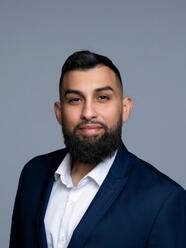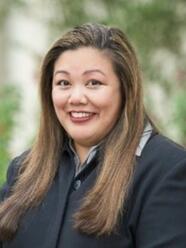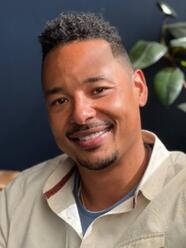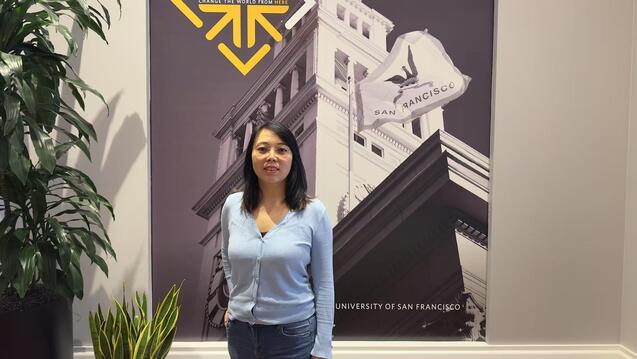
Alumni Recruiters Give Tips for Making It to the Next Round
At a time when each job opening receives an average of 150 applications, how can you stand out?
Enter these three USF alums, working as recruiters in construction, health care, and the nonprofit sector. Here, they share tips on how to stand out from the competition and land a job.

Marcos Madrigal ’12, Architecture
Project Manager, Cahill Contractors, San Francisco
What are you looking for when reviewing a new grad’s resume?
I love to see applicable experience of any kind, whether it’s direct experience with construction or volunteering with Habitat For Humanity. I make sure to look for keywords that show interest in construction — words like “building,” “construction,” “safety,” “design.” It sounds simple but posted roles get spammed with so many resumes that don’t pertain at all to the advertised role. I also check to see if they earned a degree in — or even took classes in — what I call our “big three” majors: architecture, civil engineering, and construction
What are you looking for when a candidate shows up in person?
I appreciate when you can come in and be yourself. So often the person who comes in to interview is completely different than who the resume described. Sure, interviews can be nerve-racking, but take a deep breath and remember that we’re not just looking for a resume recitation — we’re also hiring for personality, and we want someone who will work well with the rest of our team.
Also, do your research on our company. Show me that you know who we are and tell me why you want to join us. It shows when someone takes the time to understand our values and principles. To that end, be at least a little familiar with the different types of work we do — have an idea of our current projects and be able to discuss why you'd want to work on one.
Any other tips?
Research every company you’re interested in — it shows when a candidate is familiar with our market and can differentiate between us and our competitors. Remain open to fields that aren’t familiar to you. For example, if you have a degree in architecture, don’t strictly look at roles at an architecture firm — maybe consider a position in construction management. You might discover a new passion. Lastly, ask the interviewer thoughtful questions that come up during your research — this might be your only opportunity interviewing for this role or company, so use your time wisely and get all the information you need before you commit, because you’re interviewing us, too.

Leilani Villena Patacsil ’96, Nursing
Talent Acquisition Partner, UCSF Benioff Children’s Hospital Oakland
What’s your best interview advice?
- Show up on time! But if you can’t avoid being late, communicate. Call, email, or text — or do all three — to show that you’re aware and conscientious of other people’s time.
- Be kind to those with whom you interact prior to the interview — receptionists, assistants, etc.
- Dress professionally and behave professionally.
- Take a deep breath, be yourself, and show your confidence.
- Shake hands with all of the interviewers at the beginning and the end of the meeting.
- Prepare for the interview by practicing behavioral questions. Think about how you conducted yourself in past roles or situations, or how you would conduct yourself in future ones.
- Have a portfolio of extra resumes and cover letters.
- Know your value proposition — be able to market yourself and highlight how your unique skills can benefit the company.
- Ask your interviewer at least one or two insightful questions based on your research.
- Send a thank-you note by mail — not by email.
Any other advice?
- Do not just apply everywhere; be strategic. For example, if you’re seeking a pediatric nursing position, apply to pediatric hospitals.
- Furthermore, only apply to positions that match your experience and background.
- Before submitting any applications, be sure to review your resume and cover letter by spell-checking, checking for grammatical errors, and having someone else review both documents.
- Network with people in your targeted industry and find out how they started. Don’t be afraid to ask for their guidance.

Azkia Muhammad ’17, Communication Studies
Senior Recruiter, A Better Way Inc., Berkeley
What are you looking for when you’re hiring a recent grad?
Internship or any paid work experience that aligns with your goals. On-campus jobs are good, too, just not quite as valuable since student jobs are typically less demanding.
How can USF grads set their resumes apart from others you might be looking at?
Show alignment between your major and your desired role, and make sure to display that your geographic location aligns with that role. (Don’t apply to in-person jobs in a city or state you don’t live in; you’d be surprised at how many people do.) Bilingual fluency is a bonus, so definitely note that. And if you have any internships or paid work experience in our industry, as I mentioned above, definitely make a point to highlight it on your resume.
What should I be sure to do if I’m invited to an interview?
Read up on our company mission and values and pinpoint how it connects with your own career goals. Answer questions succinctly, and come prepared with questions of your own. Show up 10 minutes early and have a printed resume — or several! — and a pen and notepad to take notes. Then actually take them.
Can you give us a tip about the nonprofit industry?
We mostly hire folks coming out of graduate school, so I don’t hire a lot of undergraduates. But the basic guidelines I’ve given above would benefit anyone applying for a role at A Better Way. For non-specialized backgrounds, I’d say the most in-demand capacities in the workplace are collaboration, creativity, and empathy. Folks should come out of undergrad with a willingness to learn and an aspiration to grow professionally.


